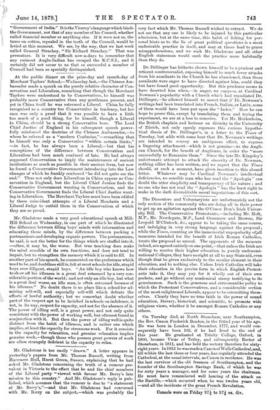Dr. Dollinger has hitherto shown himself to be a prudent
and. reticent controversalist, exposing himself to much fewer attacks from his assailants in the Church he has abandoned, than those assailants were eager to have directed against him, could they but have found good opportunity. But this prudence seems to have deserted him when,—in anger, we suppose, at Cardinal Newman's popularity with a Church which had repudiated Dr. Dallinger,—he allowed himself to assert that if Dr. Newman's writings had been translated into French, Italian, or Latin, some of them would have been put upon the "Index." How he can hope to prove this, except by translating them and trying the experiment, we are at a loss to conceive. Yet Mr. Heidenheim, the British chaplain and lecturer on divinity in the University of Zurich, not only openly espouses this curious hypothe- tical thesis of Dr. Difdlinger's, in a letter to the Times of Tuesday, but adds with some heat that Dr. Newman's writings are intended to convey an ambiguous effect, to express a lingering attachment—which is not genuine—to the Angli- can Church, for the benefit of Anglicans, in order the "more successfully to Romanise them." Since the late Mr. Kingsley's unfortunate attempt to attack the sincerity of Dr. Newman, nothing sillier has been written, and we regret that the Times should, at such a moment, have given insertion to this absurd letter. Whatever may be Cardinal Newman's intellectual deficiencies, no sensible man who has read the " Apologia " can doubt the utter simplicity and transparency of his nature ; and no one who has not read the " Apologia " has the least right to make in the dark discreditable moral imputations of this sort.


































 Previous page
Previous page